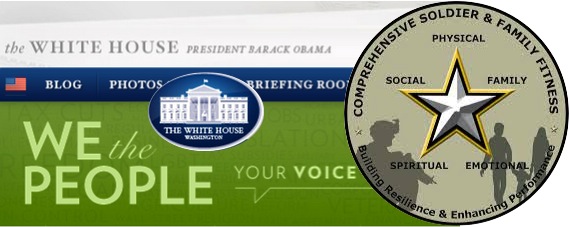White House Addresses Military Spiritual Fitness Training
The US military has a real problem with mental health and suicides. The military is addressing these issues with hotlines, training, and a wide array of professional mental health training to not just address issues but to change culture. A component of this has been “spirituality,” which relies heavily on chaplains, like chaplains, has neglected the many humanists and other nontheists in the military. A full two years ago a petition was submitted protesting the lack of nonreligious accommodation in the program. The White House has weighed in highlighting a number of changes to the Army’s spiritual fitness program (which is the prototype for all branches).
Sources: Spiritual Fitness Overview; Original Petition; White House Response
The White House responded to a petition calling for an end to unconstitutional discrimination against non-religious service members through the spiritual fitness programs. Dustin Chalker, originator of the petition, long-time MAAF member, former plaintiff with MRFF was an active Army soldier at the time and is now a Medical school student. He had this to say about the petition: “When I was in the Army I was forced to go to mandatory “Spiritual Fitness” training (lecture style, chaplain-led) and I did file complaints with Equal Opportunity (EO) and the Inspector General (IG). They were brushed aside, and I didn’t even get the results until after I had left the military over a year after the original complaint.” Chalker was no more impressed with the White House response than the EO or IG responses.
There are a number of actual improvements to the overall program. The spiritual questions on the “Global Assessment Tool” were key concerns. Those questions led to reports that a soldier was somehow ‘broken’ because they weren’t spiritual. By removing the word ‘spiritual’ from the questions, nontheists are better able to focus on meaning rather than spirits. The concern with the old questions was that they would create incorrect results by mis-categorizing an non-spiritual but otherwise well-grounded soldier. Furthermore, the negative feedback would unfairly degrade soldiers who didn’t hold supernatural beliefs. Hopefully the new questions will return better results for soldiers and the Army.
The original questions were: 1) I am a spiritual person 2) My life has lasting meaning 3) I believe that in some way my life is closely connected to all humanity and all the world 4) The job I am doing in the military has lasting meaning 5) I believe there is a purpose for my life. New question changes: 1) I am a person of dignity and worth. 2) same but with “lasting” removed. 3) (no change) 4) “lasting” changed to “enduring” 5) (no change).
A second major reform is reducing the visibility of the spiritual fitness programs. The spirituality programs were made officially optional shortly after early objections from MAAF and secular organizations. This new ‘optional’ status applies to all “spiritual” training programs and courses. A March 2013 directive relaunched the Army spirituality programs reiterating the optional nature of the program. The new program also strongly emphasized the commanders will have no access to spirituality test results or training completion. The White House response says “soldiers are free to disregard the feedback.” Anonymity and privacy is an important part of any treatment of personal beliefs. However, an Army-wide, multi-million dollar training program to resolve real issues facing soldiers can’t be engineered specifically to favor or exclude some soldiers.
There is a strong coordination between chaplaincy and spiritual fitness. Chaplains also claim to support all personnel and to be spiritual and optional. However, they are also highly-visible and influential leaders in any unit. Their visibility and influence is expressed through and increases with the spiritual fitness programs. From the MAAF coverage of spirituality:
Chaplains are generally not the ‘official’ proponents for these spiritual fitness programs, but they are often the chief advisors and sole resources provided. Chaplains currently provide, in practice, only the god-based/supernatural kind of spiritual help. Military leaders seeking to include nontheists in spiritual fitness must go outside the chaplaincy and, at least for now, outside the military in order to find authentic representation of nontheists.
The spiritual fitness programs have languished while other programs have expanded. The training modules, 70 pages of transcripts with slides and videos, have been essentially unchanged for years now. Prayer is still presented as nonreligious. Atheists and humanists are not even mentioned. Christian resources are presented as secular. Testimonials are generally Christian or at least religious. Mentions of non-Christian beliefs are only in lists of other beliefs supported but not in testimonials or suggested activities. The Meaning-Making section tends to Christian themes of Times of Testing, Human Destructiveness, Ultimate Justice, and Greater Purpose. These and other issues suggest a continuing need for reform, not just a sequestration of the program to those who identify as spiritual (and Christian).
The largest portion of the White House response was simply to assert “the CSF program does not promote religion.” The program, they say, “encourages soldiers to develop inner strength and resilience, whether soldiers take a religious or non-religious approach to such matters.” And that is really the core of the issue. The spiritual fitness programs have a wide range of religious options and are closely aligned with the chaplaincy, which also focuses on (divine and supernatural) religious programs. And though there are a good number of purely secular options, where is the outreach and inclusion humanist and other non-Christian values-based resources, testimonials, and programs?
Please add your experiences and comments about the CSF2 spiritual fitness program below.

